INSIDE ISSUE 19.12 | March 20, 2020
 BIG STORY: State budget revenue forecasts in limbo amid pandemic
BIG STORY: State budget revenue forecasts in limbo amid pandemic
NEWS BRIEFS: Virus could impact uninsured disproportionately, experts say
COMMENTARY, Brack: New normal involves shared sacrifice for common good
SPOTLIGHT: The Felkel Group
MY TURN, Palm: Surveillance monitoring vitally needed to manage virus crisis
FEEDBACK: Hooray for South Carolina, more
MYSTERY PHOTO: A white flower among azaleas
Friends and readers,

This coronavirus crisis is dealing a blow to everyone. But South Carolinians will get through it, just like we get through hurricanes and other disasters.
We’re proud to offer Statehouse Report for free. For more than a dozen years, we’ve been the go-to place for insightful independent policy and political news and views in the Palmetto State. And we love it as much as you do.
But now, we can use your help. If you’ve been thinking of contributing to Statehouse Report over the years, now would be a great time to contribute as we deal with the crisis. In advance, thank you.
— Andy Brack, editor and publisher
BIG STORY: State budget forecasts in limbo amid pandemic
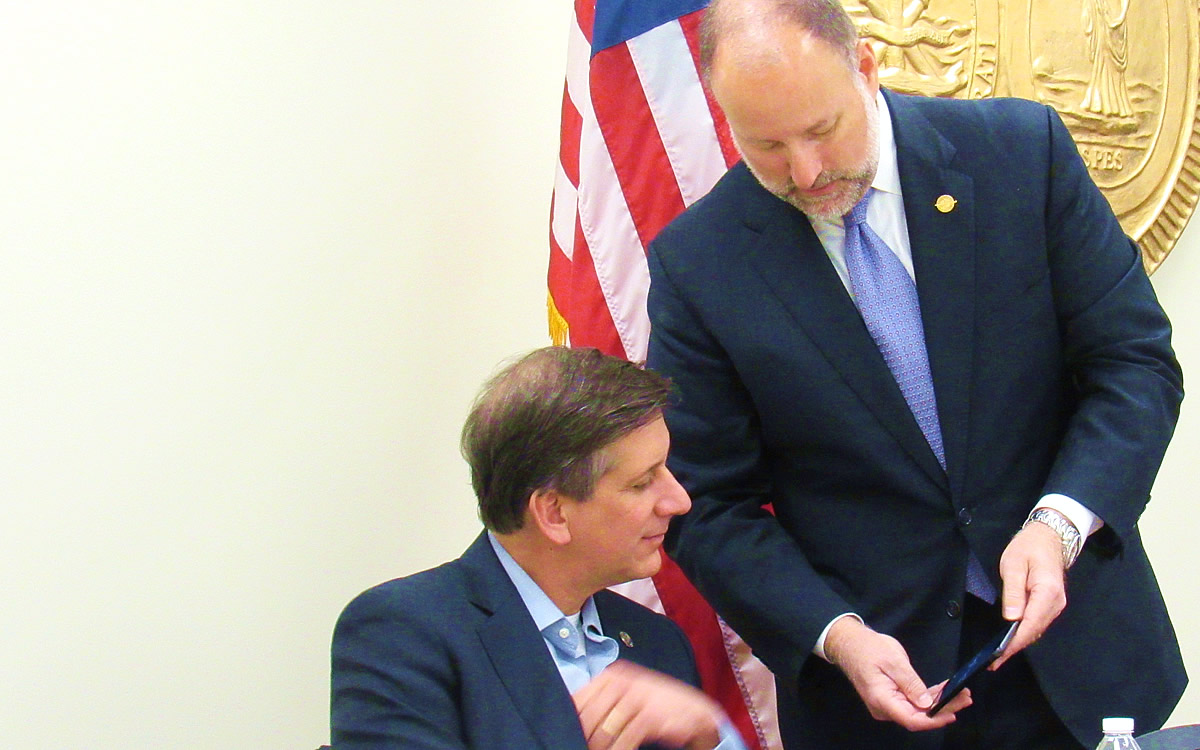
By Lindsay Street, Statehouse correspondent | Among the many unknowns about the coronavirus pandemic, one thing has become clear: the state’s budget is not going to be the $10 billion package passed by the House just 10 days ago.
“We are in new times and the only thing we know is that the financial reality of two weeks ago no longer exists,” Senate Finance Committee member Vincent Sheheen told Statehouse Report Thursday. “Under any circumstance, the big projected ($1.8 billion) surplus is no longer here anymore.”
The Camden Democratic senator’s home county has been hard-hit by the virus in the early days of the outbreak. As of Thursday, Kershaw County had 29 positive cases.
Health officials have reported 81 cases across 17 counties — a six-fold increase over a week’s time.
As uncertainty grows for public health and the economy, the state Senate gave second reading this week to a continuing budget resolution, teeing it up for a single vote in both chambers to keep government lights on after June 30.
But lawmakers want a real, responsive budget. They are grappling with the question of how hard and how long the pandemic will roil the economy and disrupt state revenues.
The S.C. Revenue and Fiscal Affairs Office’s Board of Economic Advisors will meet April 9 to talk about potential impacts. The meeting will provide the results of a financial stress test that will guide the Senate’s budget process.
Threat unknown
Public health precautions have prompted calls for social distancing, working from home and curbing gatherings of people, such as eating in restaurants and going to church. The economic toll is unfolding.
 The S.C. Department of Employment and Workforce reported a 400 percent increase in jobless claims over the past week. The U.S. Labor Department reported Thursday a 30 percent jump in joblessness for the last week — accounting for 281,000 people nationwide who are newly seeking unemployment benefits.
The S.C. Department of Employment and Workforce reported a 400 percent increase in jobless claims over the past week. The U.S. Labor Department reported Thursday a 30 percent jump in joblessness for the last week — accounting for 281,000 people nationwide who are newly seeking unemployment benefits.
Tourism and manufacturing, two of the state’s largest employers, are expected to be hit. Volvo announced it would temporarily shutter its Berkeley County plant until mid-April, although BMW pledged to remain open for the time being.
“If the disruption in world trade continues to reduce imports and exports, manufacturing states that are more reliant on the global economy for raw materials and parts could be particularly vulnerable. If travel continues to decline … states with tourism-based economies may feel the impact especially hard,” Jeff Chapman, director of the state fiscal health project at The Pew Charitable Trusts, penned in an analysis this week.
How much the economy will suffer — and how state revenues are impacted — will depend on how long public health practices will curb business and jobs, economists say. Some economists have even floated the possibility of a depression as some epidemiological models show a year-long need for social distancing to keep from overwhelming the nation’s hospital systems.
Surplus provides a buffer
RFA Executive Director Frank Rainwater said this week that he expects the state’s projected surplus from the past two budget cycles — roughly $600 million — to buffer losses during March and April.
“South Carolina is in good shape to weather a downturn. The question being just how strong that downturn is,” he said, adding that the state could still see positive growth in revenues. “I’m not seeing anything to think we are at risk of losing all that surplus at this point.”
But downturns have a multiplier effect on state budgets, Pew’s Chapman said. In addition to hitting the state’s largest revenue source (individual income tax), more people will likely apply for unemployment benefits and possibly Medicaid.
“Revenue is going to be declining and costs are going to be rising at the same time,” Chapman told Statehouse Report, adding that this comes at a time where states are just beginning to return to normal spending levels following the 2008 recession.
Summerville Republican Sen. Sean Bennett, a member of the Senate Finance Committee, said he doesn’t expect state revenues to be hit like the recent Great Recession, where lawmakers had to come in mid-year and address shortfalls with cuts.
“This is a short-term thing, this whole coronavirus economic downturn is not a structural economic problem,” Bennett said.
Budgeting in the time of coronavirus
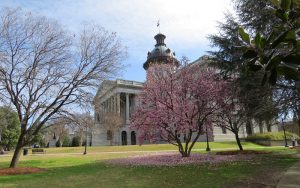 Most lawmakers agree that, aside from the public health response and the budget, the session is over for any big issue. That means the fate of Santee Cooper will be decided at a later time, possibly in a special session later this year. It also means that the perennial debate on abortion will likely wait.
Most lawmakers agree that, aside from the public health response and the budget, the session is over for any big issue. That means the fate of Santee Cooper will be decided at a later time, possibly in a special session later this year. It also means that the perennial debate on abortion will likely wait.
The session is scheduled to end mid-May, and the fiscal year ends June 30.
The soonest that senators are expected to begin budget-writing is after the April 9 projections. That could mean the budget won’t be completed until May or later. Then it must go to the House for approval before going to the governor’s desk.
“We’re going to have to approach the budget differently than we ever have before,” Sheheen said.
Lawmakers may choose to make some funding contingent, or could leave the door open to address spending in the off-session.
“This is not a one-off where you do something and you’re done,” Sheheen said. “We have to be ready and nimble to write a budget on the circumstances as we know it then and revisit it as the weeks go by.”
Bennett said a late budget is not out of the question. That means it won’t be passed until May or possibly June.
“In the best-case scenario, we are looking at a late budget. In the worst-case scenario, we may operate under a continuing resolution for a short period of time,” he said. “We don’t want to rush a budget through and not be accurate.”
- Have a comment? Send to: feedback@statehousereport.com
Virus could impact uninsured unevenly, experts say

By Lindsay Street, Statehouse correspondent | One in 10 South Carolinians are without health insurance as the state runs into a growing crisis with the coronavirus.
Cases of the coronavirus are reported at 81 as of Thursday. As many as 12 percent of reported cases could result in hospitalization, according to the Centers for Disease Control.
The uninsured could face life-altering debt if hospitalized, and they could unknowingly spread the disease if they continue to work and do not seek medical care due to finances, Palmetto Project Director of Programs Shelli Quenga said.
At the end of 2019, the state’s uninsured were tabulated at 522,000.
The Kaiser Family Foundation released a fact sheet this week on how the virus could affect the uninsured population. The report found:
- Many uninsured work in jobs that puts them face-to-face with the public and could increase their exposure rates;
- Construction workers, restaurant workers, janitors and other similar sectors were most at risk of not being insured;
- Financial consequences are severe for uninsured workers to take time off of work;
- The uninsured may forego testing due to expense or not having a regular care doctor; and,
- Any hospitalization bill would likely financially cripple them.
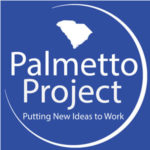 What we know right now is people can get tested and they don’t have to worry about testing. The problem is if you test positive and if you already have a compromising health situation … you don’t have any access to treatment,” Quenga said.
What we know right now is people can get tested and they don’t have to worry about testing. The problem is if you test positive and if you already have a compromising health situation … you don’t have any access to treatment,” Quenga said.
Many uninsured in South Carolina have a health condition that could make a COVID-19 diagnosis deadly: asthma, high blood pressure or diabetes, she said.
“The potential for a downward spiral is very high when you have a lot of uninsured people, a lot of people who have existing diagnoses that are unknown.”
For those seeking coverage and have seen a change in their employment, South Carolina has workforce requirements authorized for its Medicaid benefits for people with low or no income, but those requirements have not been implemented yet, Quenga said.
To help streamline Medicaid applications, the federal government has waived eligibility renewals for those currently in the program, she said.
The Palmetto Project is offering updates on coronavirus and help. Text “Palmetto” to 565-12.
In other state news:
McMaster invokes emergency powers. After banning eat-in dining this week in response to the coronavirus epidemic, Gov. Henry McMaster invoked an executive order Thursday that called on his emergency powers, including the ability to ban small groups from convening. That wasn’t the purpose of the order, which was to send non-essential state employees home, mandate public colleges finish the semester through online instruction, allow unemployment claims to be expedited, suspend of unemployment insurance payments for employers until June 1, and suspend of certificate of need regulations needed for building of medical facilities. Read the order here (the powers are under the “whereas” sections).
DHEC gets $45 million. The S.C. Department of Health and Environmental Control will get an additional $45 million to help with testing and response to the coronavirus pandemic. McMaster signed the bill into law Thursday after it unanimously passed the House. After the House vote, which took place with all members physically distant and some in the balcony, House Speaker Jay Lucas said they won’t return to the chamber for at least two weeks.
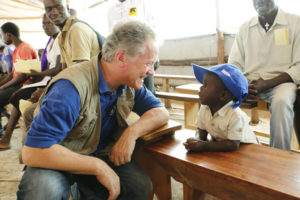
Former governor diagnosed with COVID-19. Former GOP Gov. David Beasley is one of the state’s 81 cases of coronavirus. In a letter to the Italy-based humanitarian agency World Food Programme that he leads, he said his symptoms are “relatively light.” He said they are working to trace his contacts after a recent trip to Canada, and that he will work from his home in Darlington County. He served as governor 1995 to 1999.
Initial OK given to Santee Cooper settlement. Former state Supreme Court Chief Justice Judge Jean Toal, acting as a special judge, has given initial approval this week to a $520 million settlement plan in a lawsuit against state-owned utility Santee Cooper. The settlement would refund the money to about two million electric customers after their rates were increased to cover costs at the unfinished nuclear power plant. The settlement is expected to receive final approval this summer. Read more.
Local elections postponed. McMaster and the S.C. Election Commission announced this week all elections scheduled for March and April will be rescheduled for after May 1, though no specific date has been announced yet. Candidate filing for the month continues, however, and will close at noon March 30. See which elections are impacted here.
- Have a comment? Send to: feedback@statehousereport.com
New normal involves shared sacrifice for common good

By Andy Brack, editor and publisher | For the record, I didn’t like the old normal. Too much of substandard education, social injustice, unbalanced tax structure and vitriolic politics.
 You can imagine what I think of this new normal, coronavirus. I dislike it more. People scared. Toilet paper hoarded. Businesses cratering. Politics, well that’s still vitriolic.
You can imagine what I think of this new normal, coronavirus. I dislike it more. People scared. Toilet paper hoarded. Businesses cratering. Politics, well that’s still vitriolic.
But let’s try to look for a silver lining. At least now, perhaps people are better understanding the notion of shared sacrifice and the common good.
The notion of common good is built into our country’s DNA. Our founding fathers wanted to shrug off an oppressive system and take control of our destiny through a democratic system powered by people. The underlying principle generally was that people, not a king, would decide how to do things, which would benefit the majority.
In challenging times for the common good, people were to give a little to save a lot down the road. Give some in taxes to build a road to benefit all. Give a little to provide for the common defense, education, good working conditions and economic infrastructure.
It’s all outlined in the U.S. Constitution, the preamble of which discusses forming a more perfect union to “establish Justice, insure domestic Tranquility, provide for the common defence, promote the general Welfare, and secure the Blessings of Liberty to ourselves and our Posterity.”
“Welfare” in this case doesn’t mean handouts by the government to people who are down on their luck. It means people in towns and villages across the country working together to accomplish common goals, or goods, to make their areas better for all.
“‘Promote the general Welfare’ to me means we provide the environment that promotes opportunity for success,” GOP Rep. Bill Herbkersman of Bluffton reflected in 2017.
The notion of common good has served America well. Early on, it created a national bank to boost industrialization. As farmers exploited the nation’s bounty, entrepreneurs built the nation’s infrastructure.
The common good, through Franklin Delano Roosevelt’s New Deal, whipped the Great Depression. The Greatest Generation sacrificed at home and abroad for the nation to win World War II. Then came long-delayed successes in civil rights that led to improvements across the nation to improve education and reduce poverty.
What followed wasn’t pretty. First was the “me generation” of the 1970s that fueled Wall Street’s greed. Unfortunately, we’ve created a financial system corrupted by income inequalities that are at the root of tearing our nation apart. Intertwined has been a divisive partisan fissure that has twisted the knives of politics into festering sores of race and class.
So in recent years, the whole notion of our duty for a common good has suffered. That’s why it’s heartening to see so many Americans self-isolating during the coronavirus crisis that’s slamming the nation. Yes, there’s a selfish reason for it — to not get the horrible COVID-19 disease. But there’s also a shared community benefit of being at home for a few weeks -so people won’t die in great numbers as with the flu pandemic of 1918.
Some say actions taken by local, state and national governments are out of line and going too far — that everyone is overreacting and you can’t assume what we’re doing now will have long-term gain. One Charleston man posted this to Facebook: “The response — crashing the global economy– is grossly disproportionate to the risk. We are not dealing with smallpox or the plague here.”
Most people argued with him and supported the shared sacrifice of staying at home and losing some money and jobs in an attempt to get past the impacts of the virus more quickly.
One Florida man observed, “The fact that many Americans are doing this is a sign of hope.” A New York pastor with ties to South Carolina added, “I am seeing a lot of people winnowing out the chaff in their lives. That and there are so many lessons to be gleaned. It is a shame that the pain threshold is so high before we start paying attention.”
Our grandparents and great-grandparents sacrificed for years to get through the Great Depression and World War II. We need to follow their example to get through this national crisis.
- Have a comment? Send to: feedback@statehousereport.com.
The Felkel Group
 The public spiritedness of our underwriters allows us to bring Statehouse Report to you at no cost. This week in the underwriter spotlight is The Felkel Group, a battle-tested public affairs and business development firm that assists corporations, associations and not-for-profits that are serious about their long-term success. The Felkel Group solves problems, crafts and delivers messages, helps organizations to manage crisis, and uses a wealth and breadth of valuable relationships to help to seal deals.
The public spiritedness of our underwriters allows us to bring Statehouse Report to you at no cost. This week in the underwriter spotlight is The Felkel Group, a battle-tested public affairs and business development firm that assists corporations, associations and not-for-profits that are serious about their long-term success. The Felkel Group solves problems, crafts and delivers messages, helps organizations to manage crisis, and uses a wealth and breadth of valuable relationships to help to seal deals.
The Felkel Group is also home to an outstanding advocacy tool called The Rap Index, a powerful intelligence tool that employs sophisticated computer modeling and profiling techniques to help organizations find their most effective advocates.
- To learn more about The Felkel Group and its Rap Index, go to: http://www.felkelgroup.com.
Surveillance monitoring needed to manage virus crisis

By Fred Palm | Our South Carolina emergency plan is an all-event skeleton. Depending upon the particular threat, customization to the plan is made. Even in the overall skeleton plan, any epidemic event is a second thought found in an appendix (14-1) to the general model for action. In these plans, there is no pandemic appendix, so with COVID-19, we presumptively start as if the virus is an infection.
 An epidemic requires a swift model that leaps ahead of the presenting of requests for medical services. State-level authorizations and equipment requests passed up the line will not be delivered in time. In fact, little time exists if an infection doubles every five days.
An epidemic requires a swift model that leaps ahead of the presenting of requests for medical services. State-level authorizations and equipment requests passed up the line will not be delivered in time. In fact, little time exists if an infection doubles every five days.
Social science surveys estimate the size of something, the incidence in the population. In this election season, for example, we are bombarded with polling data about what percentage of voters, likely Republicans or Democrats, are expected to behave in a particular way. We are even told the error or range of the estimate.
Epidemiologists, however, model statistically the progressions that yield this critical understanding: A leap ahead in time and space to deploy resources and institute policy actions relevant to the situation on the ground. For example, a varying disease incidence of 0.2 percent, 2 percent, 12 percent or 22 percent implies vastly different control strategies. Closing schools is not needed at the lowest end of the range and too late at the upper end. The anticipatory leap ahead forecast supports the needed adaptation policy choice.
Gov. Henry McMaster’s plan is to test only people with symptoms. It is good to know who is positive, so they isolate themselves. But if we stop there and do not systematically sample the entire population using a big fat surveillance program, it will be too late for actions needed to stanch COVID-19. Instead, late actions will be out-raced by the fast spread of the virus.
Here’s what could help now: Panels of volunteer citizens (say 300,000) could report their condition day by day for serial tracking using a free tool like SurveyMonkey. Out of those aggregated individual reports are identified the hot COVID-19 locations. Over time, we will learn how fast the spread rate is and the policy response that is needed there. This is called survey reporting, which hospital arrivals can confirm.
The novel coronavirus is a public health emergency that needs to use a war model, not the flood model. War models anticipate the enemy while flood models respond to the situation. McMaster, apparently taking the lead of his political patron in Washington, D.C., to stay in his good graces, needs to do more. He should call Dr. James Clements, the president of Clemson University, to gear up the Clemson Survey Team, the Palmetto Cluster Computing Center and the Clemson/MUSC Artificial Intelligence Project team. Then he should promptly hire a general who will win at war. State Epidemiologist Linda Bell needs to get test kits distributed widely and start surveillance monitoring as if our lives depend on it. Why? Because they do. We need to know how big this storm is and where it is with better accuracy than day by day recording counts of people infected.
Edisto Island resident Fred Palm is a retired professor of analytics at the John Jay College Graduate School of Public Management. Earlier in his career, he was a developer of the New York City Mayor’s Management Report, survey research director and academic research director who used multivariate clustering and regression modeling to predict behavior.
Hooray for South Carolina
![]() If you have read Andy Brack’s “ We Can Do Better, South Carolina,” you will understand where I am coming from.
If you have read Andy Brack’s “ We Can Do Better, South Carolina,” you will understand where I am coming from.
Our history is not one of fast movement towards positive goals. It is not our tradition to blame folks for moving so slowly. It is also our tradition not to really praise folks for doing excellent things.
It is my pleasure to compliment our state for the phenomenal thing that happened just recently in the Democratic primary. (I am a Republican who does not meddle in the other party’s doings.)
Just prior to the election, U.S. Rep. James Clyburn, now the Majority Whip in the House, spoke on supporting Joe Biden. He said that the most important thing was not that we know him, but that he knows us.
The vote in South Carolina was a harbinger of what was to come in other states. Biden won most of them by very large margins. He even won Washington state where Sanders was heavily favored. Despite what happens next with the coronavirus, South Carolina has changed presidential politics for the entire country.
What does that mean for South Carolina? It sets us apart from others as a forward-thinking group of people. That does not mean that we will solve all of our problems. But let us not forget what just happened. We have affected the entire United States of America.
— Arnold Hillman, Bluffton, S.C.
Amen to your debate comments
To the editor:
Amen and amen to your comments about recent debate in Charleston! It was such a waste of time for everyone involved. The moderators certainly did not enforce any of the rules stated upfront, and allowed the “debate” to fall into chaos from the start. I recall recently deceased Jim Lehrer, who was a skilled moderator of debates, able to obtain useful information from candidates while still maintaining a sense of propriety and calm.
— Freida McDuffie, Charleston
What do you think?
We love hearing from our readers and encourage you to share your opinions. But you’ve got to provide us with contact information so we can verify your letters. Letters to the editor are published weekly. We reserve the right to edit for length and clarity. Comments are limited to 250 words or less. Please include your name and contact information.
- Send your letters or comments to: feedback@statehousereport.com
A white flower among azaleas

What in the world is this white flower doing among azaleas? And just what in the heck is it? Send your best guess to feedback@statehousereport.com. And don’t forget to include your name and the town in which you live.
Our previous Mystery Photo
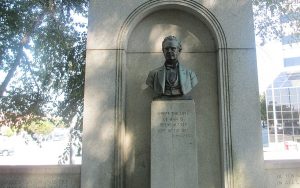 Our March 13 image, “A bust of whom?” was familiar to lots of readers. Hats off to all of the sleuths who recognized the monument on the Statehouse grounds of Dr. J. Marion Sims (1813-1883), known by some as the “father of modern gynecology.”
Our March 13 image, “A bust of whom?” was familiar to lots of readers. Hats off to all of the sleuths who recognized the monument on the Statehouse grounds of Dr. J. Marion Sims (1813-1883), known by some as the “father of modern gynecology.”
Congratulations to: Dale Rhodes of Richmond, Va.; Daniel Prohaska of Moncks Corner; Jay Altman, Daniel Brennan and Jack Shuler, all of Columbia; George Graf of Palmyra, Va.; Harvey Shackelford of Newberry; David Lupo of Mount Pleasant; Henry Eldridge of Tega Cay; Charles Davis of Aiken; Frank Bouknight of Summerville; Philip Cromer of Beaufort; Cricket Adams of Myrtle Beach; Steve Willis of Lancaster; Don Clark of Hartsville; and Vic Carpenter of Lugoff.
Graf said Sims was a native of Lancaster. “After graduating from South Carolina Medical College, Sims began practicing medicine in Lancaster, South Carolina. Shortly after, he moved to Montgomery, Alabama. There, he pioneered new surgical techniques for treating women and invented 71 instruments to aid in the process of childbirth. In 1853, he moved his practice to New York and established the Woman’s Hospital of the State of New York, one of the first hospitals in the country devoted solely to the care of women. Sims also established a cancer hospital in New York, which is known today as the Memorial Sloan-Kettering Cancer Center.
“A statue of J. Marion Sims, called the “father of gynecology,” was removed from New York’s Central Park on April 17, 2018. Sims is a controversial figure due to his experiments on female slaves who were rarely given anesthesia.”
- Send us a mystery: If you have a photo that you believe will stump readers, send it along (but make sure to tell us what it is because it may stump us too!) Send to: feedback@statehousereport.com and mark it as a photo submission. Thanks.
ABOUT STATEHOUSE REPORT
Statehouse Report, founded in 2001 as a weekly legislative forecast that informs readers about what is going to happen in South Carolina politics and policy, is provided to you at no charge every Friday.
Meet our team
- Editor and publisher: Andy Brack, 843.670.3996
- Statehouse correspondent: Lindsay Street
Buy the book
Now you can get a copy of editor and publisher Andy Brack’s We Can Do Better, South Carolina! ($14.99) as a paperback or as a Kindle book ($7.99). . The book of essays offers incisive commentaries by editor and publisher Andy Brack on the American South, the common good, vexing problems for the Palmetto State and interesting South Carolina leaders.
More
- Mailing address: Send inquiries by mail to: 1316 Rutledge Ave., Charleston, SC 29403
- Subscriptions are free: Click to subscribe.
- We hope you’ll keep receiving the great news and information from Statehouse Report, but if you need to unsubscribe, go to the bottom of the weekly email issue and follow the instructions.
- © 2020, Statehouse Report, a publication of City Paper Publishing, LLC. All rights reserved.
- Read our sister publications: Charleston City Paper (every Wednesday) | Charleston Currents (every Monday)















 We Can Do Better, South Carolina!
We Can Do Better, South Carolina!